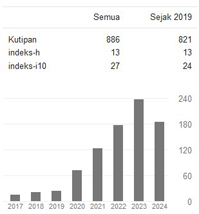Encountering Ethical Issues in a Sensitive Case Study Research: A Qualitative Exploration of the Victimized Ahmadiyya Minority in Indonesia
Abstract
This article examines the importance of understanding ethical dilemmas in social research on sensitive topics. The paper is elaborated and presented based on the literature review and experiences in sensitive research. This article summarizes ethical issues, the Ahmadiyya case as a sample of a sensitive topic, ethical dilemmas, their resolutions, and lessons learned. This article reflects on the opportunities for fluent analysis in a sensitive case. This article is an introductory study of the ethical dilemma in analyzing a sensitive issue.
Keywords: Indonesia, the Ahmadiyya Group, Violence, Ethical Dilemma, Sensitive Research
Full Text:
PDFReferences
Abel, Doenja. "The position of religious minorities in a diverse archipelago: the Indonesian government's framing of the Ahmadiyya minority and its effects." Bachelor's thesis, 2013.
Avonius, Leena. "the Ahmadiyya & freedom of religion in Indonesia." ISIM Review 22 (2008): 2.
Bowen, Glenn A. "Preparing a qualitative research-based dissertation: lessons learned." The Qualitative Report 10, no. 2 (2005): 208–222.
Burhani, Ahmad Najib. "It is a Jihad": Justifying Violence towards the Ahmadiyya in Indonesia." Trans: Trans-Regional and-National Studies of Southeast Asia 9, no. 1 (2021): 99-112.
Burrell, Jenna. "The field site as a network: A strategy for locating ethnographic research." Field Methods 21, no. 2 (2009): 181–199.
Cammett, Melani. "Using proxy interviewing to address sensitive topics." Interview research in political science (2013): 125–143.
Cohen, Nissim, and Tamar Arieli. "Field research in conflict environments: Methodological challenges and snowball sampling." Journal of Peace Research 48, no. 4 (2011): 423-435.
Concone, Maria Helena Villas Bôas, and Ceneide Maria De Oliveira Cerveny. "Research and the (free and) informed consent." Ciência & Saúde Coletiva 13, no. 2 (2008): 341-349.
Cowles, Kathleen V. "Issues in qualitative research on sensitive topics." Western Journal of Nursing Research 10, no. 2 (1988): 163–179.
Crouch, Melissa. "Indonesia, militant Islam, and Ahmadiyah: Origins and implications." ARC Federation Fellowship,' Islam, Shariah, and Governance 'Background Paper Series 4 (2009).
Crow, Graham, and Rose Wiles. "Managing anonymity and confidentiality in social research: the case of visual data in Community research." (2008).
Devers, Kelly J., and Richard M. Frankel. "Study design in qualitative research--2: Sampling and data collection strategies." Education for health 13, no. 2 (2000): 263
Dickson-Swift, Virginia, Erica L. James, Sandra Kippen, and Pranee Liamputtong. "Risk to researchers in qualitative research on sensitive topics: Issues and strategies." Qualitative Health Research 18, no. 1 (2008): 133–144.
Dickson-Swift, Virginia, Erica L. James, Sandra Kippen, and Pranee Liamputtong. "Doing sensitive research: What challenges do qualitative researchers face?." Qualitative research, 7, no. 3 (2007): 327–353.
Elmir, Rakime, Virginia Schmied, Debra Jackson, and Lesley Wilkes. "Interviewing people about potentially sensitive topics." Nurse researcher, 19, no. 1 (2011).
Farquhar, Clare, and Rita Das. "Our focus groups are suitable for 'sensitive' topics." Developing focus group research: Politics, theory, and practice (1999): 47-63.
Finlay, Linda. "'Rigour,’ 'ethical integrity 'artistry'? Reflexively reviewing criteria for evaluating qualitative research." British Journal of Occupational Therapy 69, no. 7 (2006): 319–326.
Ganga, Deianira, and Sam Scott. "Cultural" insiders" and the issue of positionality in qualitative migration research: Moving" across" and moving" along" researcher-participant divides." In Forum Qualitative Sozialforschung/Forum: Qualitative Social Research, vol. 7, no. 3. 2006.
Harrell, Margaret C., and Melissa A. Bradley. Data collection methods. Semi-structured interviews and focus groups. Rand National Defense Research Inst Santa Monica ca, 2009.
Hellawell, David. "Inside–out an analysis of the insider-outsider concept as a heuristic device to develop reflexivity in students doing qualitative research." Teaching in higher education 11, no. 4 (2006): 483–494.
Hodkinson, Phil, and Heather Hodkinson. "The strengths and limitations of case study research." In learning and skills development agency conference at Cambridge, vol. 1, no. 1, pp. 5–7. 2001.
Israel, Mark, and Iain Hay. Research ethics for social scientists. Sage, 2006.
Lee, Raymond M., and Claire M. Renzetti. "The problems of researching sensitive topics: An overview and introduction." (1990): 510-528.
Lee, Raymond M. Researching sensitive topics. Sage, 1993.
Masnun, M. Ag. "Blasphemy, the Fate of Ahmadiyya in Lombok and a Critique of Religious Discourse." Mediterranean Journal of Social Sciences 8, no. 4–1 (2017): 89–98.
McCoy, Mary E. "Purifying Islam in post-authoritarian Indonesia: Corporatist metaphors and the rise of religious intolerance." Rhetoric & Public Affairs 16, no. 2 (2013): 275–316.
McCosker, Heather, Alan Barnard, and Rod Gerber. "Undertaking sensitive research: Issues and strategies for meeting the safety needs of all participants." In Forum Qualitative Sozialforschung/Forum: Qualitative Social Research, vol. 2, no. 1. 2001.
Minkler, Meredith. "Ethical Challenges for the "outside" researcher in community-based participatory research." Health Education & Behavior 31, no. 6 (2004): 684–697.
Moore, Niamh. "The politics and ethics of naming: questioning anonymization in (archival) research." International Journal of Social Research Methodology 15, no. 4 (2012): 331–340.
Morrow, Virginia. "Ethical dilemmas in research with children and young people about their social environments." Children's Geographies 6, no. 1 (2008): 49–61.
Morse, Janice M. "Strategies for sampling." Qualitative nursing research: A contemporary dialogue (1991): 127–145.
Muhtada, Dani. "State and the Protection of the Minority Rights in Indonesia: The Case of the Ahmadi Group." In the 1st International Conference on Indonesian Legal Studies (ICILS 2018). Atlantis Press, 2018.
Noland, Carey M. "Institutional barriers to research on sensitive topics: Case of sex communication research among university students." Journal of Research Practice 8, no. 1 (2012): M2-M2.
Novick, Gina. "Is there a bias against telephone interviews in qualitative research?." Research in nursing & health 31, no. 4 (2008): 391–398.
Paechter, Carrie. "Researching sensitive issues online: implications of a hybrid insider/outsider position in a retrospective ethnographic study." Qualitative Research 13, no. 1 (2013): 71–86.
Patton, Michael Quinn. "Qualitative research." Encyclopedia of statistics in behavioral science (2005).
Platzdasch, Bernhard, and Y. F. Hui. "Religious Freedom in Contemporary Indonesia: The Case of Ahmadiyah." Encountering Islam: The Politics of Religious Identities in Southeast Asia (2013): 218-46.
Probst, Barbara. "The eye regards itself: Benefits and challenges of reflexivity in qualitative social work research." Social Work Research 39, no. 1 (2015): 37–48.
Qu, Sandy Q., and John Dumay. "The qualitative research interview." Qualitative research in accounting & management (2011).
Rahman, Fatima Zainab. "State restrictions on the Ahmadiyya sect in Indonesia and Pakistan: Islam or political survival?." Australian Journal of Political Science 49, no. 3 (2014): 408–422.
Reddy, Madhavi K., Matthew T. Fleming, Nicolette L. Howells, Mandy M. Rabenhorst, Robert Casselman, and Alan Rosenbaum. "Effects of the method on participants and disclosure rates in research on sensitive topics." Violence and Victims 21, no. 4 (2006): 499–506.
Reeves, Carla L. "A difficult negotiation: Fieldwork relations with gatekeepers." Qualitative Research 10, no. 3 (2010): 315–331.
Rossi, Simone, Mark Hallett, Paolo M. Rossini, Alvaro Pascual-Leone, and Safety of TMS Consensus Group. "Safety, ethical considerations, and application guidelines for transcranial magnetic stimulation in clinical practice and research." Clinical Neurophysiology, 120, no. 12 (2009): 2008-2039.
Sanjari, Mahnaz, Fatemeh Bahramnezhad, Fatemeh Khoshnava Fomani, Mahnaz Shoghi, and Mohammad Ali Cheraghi. "Ethical challenges of researchers in qualitative studies: The necessity to develop a specific guideline." Journal of medical ethics and the history of medicine 7 (2014).
Shenton, Andrew K., and Susan Hayter. "Strategies for gaining access to organizations and informants in qualitative studies." Education for Information 22, no. 3–4 (2004): 223–231.
Sherif, Bahira. "The ambiguity of boundaries in the fieldwork experience: Establishing rapport and negotiating insider/outsider status." Qualitative inquiry 7, no. 4 (2001): 436–447.
Shesterinina, Anastasia. "Book review: Rebelocracy: Social Order in the Colombian Civil War by Ana Arjona." LSE Review of Books (2018).
Shohel, M. Mahruf C., Man Jia, Rubaiyat Jahan, and Goutam Roy. "Methodological Challenges and Concerns of Using Interview Method to Conduct Socio-culturally Sensitive Research." Bangladesh Journal of Educational Research 1, no. 2 (2015).
Silverman, David, ed. Qualitative research. Sage, 2016.
Stiles, William B. "Quality control in qualitative research." Clinical Psychology Review 13, no. 6 (1993): 593–618.
Streeton, Rosemarie, Mary Cooke, and Jackie Campbell. "Researching the researchers: using a snowballing technique." Nurse researcher, 12, no. 1 (2004): 35–47.
Sullivan, Cris M., and Debra Cain. "Ethical and safety considerations when obtaining information from or about battered women for research purposes." Journal of interpersonal violence 19, no. 5 (2004): 603–618.
Thomas, David R. "A general inductive approach for analyzing qualitative evaluation data." American Journal of Evaluation 27, no. 2 (2006): 237–246.
Tolich, Martin. "Internal confidentiality: When confidentiality assurances fail relational informants." Qualitative Sociology 27, no. 1 (2004): 101–106.
Tracy, Sarah J. "Qualitative quality: Eight "big-tent" criteria for excellent qualitative research." Qualitative inquiry 16, no. 10 (2010): 837–851.
Van Dijk, K. (2013). Introduction in Regime Change, Democracy, and Islam, the Case of Indonesia: Final Report Islam Research Programme Jakarta. Leiden, the Netherlands: Leiden University, March 1—7, Retrieved May 18, 2015, from http://media.leidenuniv.nl/legacy/irpfinal2013(2).pdf/
Walsham, Geoff. "Interpretive case studies in IS research: nature and method." European Journal of Information Systems 4, no. 2 (1995): 74–81.
Walsham, Geoff. "Doing interpretive research." European Journal of Information Systems 15, no. 3 (2006): 320–330.
Wellings, Kaye, Patrick Branigan, and Kirsti Mitchell. "Discomfort, discord, and discontinuity as data: Using focus groups to research sensitive topics." Culture, Health & Sexuality 2, no. 3 (2000): 255-267
Whiteford, Linda M., and Robert T. Trotter II. Ethics for anthropological research and practice. Waveland Press, 2008.
Whittemore, Robin, and Kathleen Knafl. "The integrative review: updated methodology." Journal of Advanced Nursing 52, no. 5 (2005): 546–553.
DOI: http://dx.doi.org/10.31385/jl.v23i2.593.149-162
Refbacks
- There are currently no refbacks.

This work is licensed under a Creative Commons Attribution-NonCommercial-ShareAlike 4.0 International License.

Copyright© 2015 JURNAL LEDALERO This work is licensed under a Creative Commons Attribution-NonCommercial-ShareAlike 4.0 International License.
Institut Filsafat dan Teknologi Kreatif Ledalero Jalan Trans Maumere-Ende - Sikka - Flores - Nusa Tenggara Timur - Indonesia Telp/Fax: 0382 2426535










